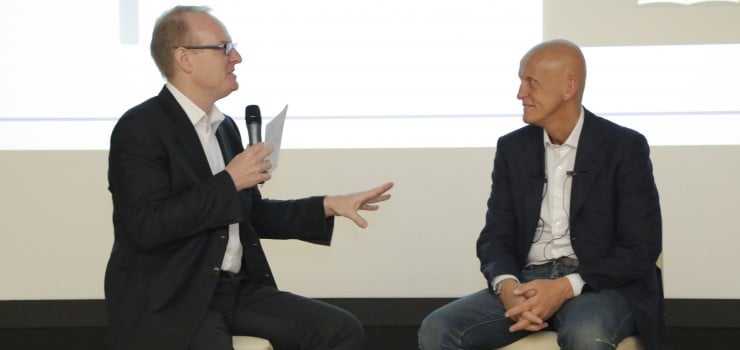
Martin Roll was moderating Q&A and plenary session with Pierluigi Collina at the “SIM 50th Anniversary Learning Series – Transformations” hosted by Singapore Institute of Management at SingTel on Friday 4 April 2014.
Pierluigi Collina is a former Italian football referee – and the world’s most famous one. He is regarded as the best football referee of all time. Voted World’s Best Referee six times, he has officiated at the highest level where decisions come under intense pressure from players, coaches, fans and millions of viewers in front of their televisions across the globe.
In 2002, he reached the pinnacle of his career when he was chosen for the World Cup final between Brazil and Germany in Yokohama, Japan.
Pierluigi Collina is more than just about football, having graduated from the University of Bologna in Economics, and worked as a financial consultant. His understanding of both the sporting and business world made a unique session for the audience of business leaders and students.
Pierluigi Collina spoke about “The Art of Decision Making: Transform and Stay on Top of Your Game”, and shared his experiences from a life-long career in the top of global football.
The main thrusts of the keynote were Reliability and Consistency, Decision-making, and Communication:
Reliability and Consistency: Making reliable and consistent decisions is critical in business. Pierluigi Collina explained how the right psychological state of mind is key to making these decisions.
Although refereeing calls for a certain amount of technical knowledge, there is undoubtedly an art in becoming an outstanding referee. And the art demonstrated by a referee during the game depends largely on his personal qualities and more often than not, it comes from being reliable and consistent.
Sportsmen and coaches expect consistent behavior from referees. Their decisions should be the same in identical or similar situations, and the same norms should be applied to both sides. However, no two situations on the field are ever completely alike, so it is up to the referee to make sure his standards are consistent.
Being consistent and reliable has a lot to do with mental and emotional faculties. A good referee needs to have a stable state of mind. Any inconsistencies in the course of the game are usually connected with psychological ups and downs. The ability to achieve the right psychological level and maintain it during the game is of fundamental importance for efficient refereeing.
Drawing examples from the field, Pierluigi Collina illustrated the importance of reliability and consistency in business.
Decision-making under pressure: Taking time to get the full picture, yet making a decision quickly, is vital. Pierluigi Collina showed how businesses can apply a step-by-step decision-making process given limited time, and turn an unfavorable situation into a positive one.
A referee’s decisions should be made as soon as he sees something, or immediately afterwards. This does not mean that decisions should be made without hesitation. It may sometimes be important to wait a moment to get the full picture of what has just happened. But hesitating for too long gives both players and coaches the impression of uncertainty, so they are more likely to start complaining if the decision is a slow one.
The decisions are not subject to formal protests which mean that controversy can be avoided if we make up our minds swiftly and decisively. And the closer we are to the game, the more important is the speed with which we make decisions. Any signs of doubt will only give rise to questions and controversy. A clear-cut decision is called for, giving the impression that the referee is completely sure about what he has seen.
Pierluigi Collina demonstrated how businesses can learn to apply the need for a step-by-step decision making process given the limitation of time and a negative situation must be turned around to positive so the game continues, in which business goes on as usual.
Communication: Referees need good channels of communication with players and coaches. Effective communication is an essential business skill, and Pierluigi Collina discussed its key attributes.
Communication is the quality of being able to get on well with others in a productive way. Good communication skills are important in any field of human activity but perhaps even more so in refereeing. Referees need to try to establish good channels of communication with players and coaches alike.
The key to establishing good communication is effective communication. When referees can communicate effectively with players and coaches, then they are likely to cooperate and not question the referee’s decisions.
Referees also have to be accessible and receptive to questions and complaints without letting the rhythm of the game being disturbed by a barrage of comments. One of the main goals of a referee is to avoid lengthy discussions and get the game going again as quickly as possible
Pierluigi Collina discussed the key attributes of effective communication and how it can be applied to everyday business.